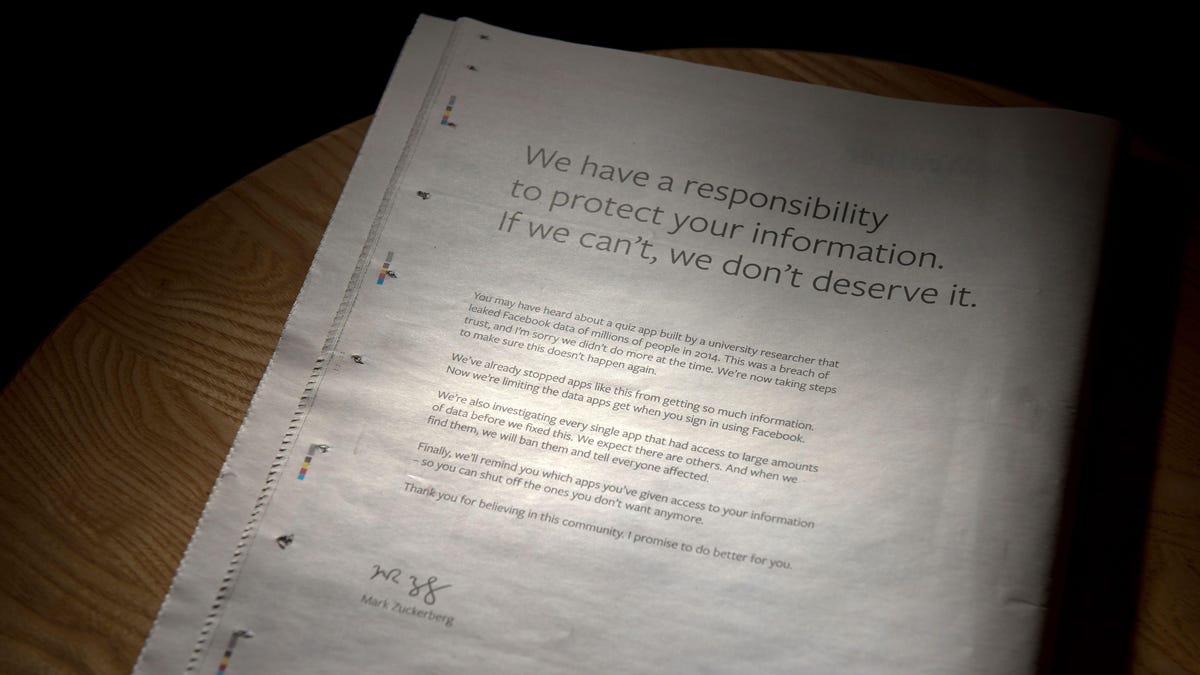Zuckerberg apologizes for data scandal in full-page ads
Facebook's chief calls the scandal a "breach of trust" and outlines preventive steps the company is taking.
Facebook CEO Mark Zuckerberg took out full-page ads in several US and UK newspapers on Sunday, apologizing for his company's involvement in the widening Cambridge Analytica data scandal.
"You may have heard about a quiz app built by a university researcher that leaked Facebook data of millions of people in 2014," Zuckerberg said in the signed ads, referring to the data analytics firm accused of misusing the social network's user information during the 2016 US election.
"This was a breach of trust, and I'm sorry we didn't do more at the time. We're now taking steps to ensure this doesn't happen again," he wrote in ads that appeared in The New York Times, The Washington Post and The Wall Street Journal, as well as the UK's The Observer, The Sunday Times, Mail on Sunday, Sunday Mirror, Sunday Express and Sunday Telegraph. Facebook also launched a TV apology ad campaign at the end of April.
Zuckerberg's apology follows news last week that information from more than 50 million Facebook users was obtained without permission by Cambridge Analytica, a data analytics consultancy hired by the Trump campaign for the 2016 presidential election. The data was obtained after roughly 300,000 users installed a personality quiz app called "thisisyourdigitallife" that was designed by Aleksandr Kogan, a Cambridge University researcher. The social network's rules at the time allowed Kogan to access data from "tens of millions" of the initial users' friends, which he later shared with Cambridge Analytica.
The scandal has rocked the 14-year-old social media giant, knocking almost $50 billion from its market value last week. It has also prompted calls from Congress for Zuckerberg to testify.
The ads appeared the same day Reuters released the results of a poll that found fewer Americans trust Facebook to obey US privacy laws. The social network was trusted to obey laws that protect people's personal information by 41 percent of Americans, compared with 66 percent who said they trust Amazon, 62 percent who trust Google, 60 percent for Microsoft and 47 percent for Yahoo.
Also on Sunday, Facebook denied reports that it has been logging Android users' call and text history without their permission. While some users' information is logged, Facebook said that the function "has always been opt-in only." The feature doesn't collect the contents of calls or texts, and information collected isn't sold to third parties, the company said.
The ads in the Sunday papers, which didn't mention Cambridge Analytica by name, sought to reassure users that Facebook had already taken steps to prevent a similar privacy breach from occurring in the future.
"We're also investigating every single app that had access to large amounts of data before we fixed this. We expect there are others," Zuckerberg said. "And when we find them, we will ban them and tell everyone affected."
Cambridge Analytica was thrust into the spotlight a little over a week ago when a whistleblower who formerly worked at the company told The Guardian and The New York Times that it had exploited the personal data of millions of Facebook users. The company is accused of holding on to the data after Facebook asked it to delete the files.
Cambridge Analytica has denied using Facebook data in its work with the Donald Trump campaign during the election.
First published March 25 at 8:20 a.m. PT.
Update at 6:42 p.m.: Added background information.
Update March 26 at 5:36 a.m. PT: Added more background information.
iHate: CNET looks at how intolerance is taking over the internet.
Life, Disrupted: In Europe, millions of refugees are still searching for a safe place to settle. Tech should be part of the solution. But is it?


